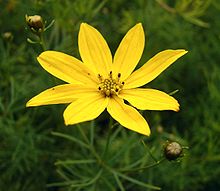- Coreopsis verticillata
-
Coreopsis verticillata 
Scientific classification Kingdom: Plantae (unranked): Angiosperms (unranked): Eudicots (unranked): Asterids Order: Asterales Family: Asteraceae Genus: Coreopsis Species: C. verticillata Binomial name Coreopsis verticillata Coreopsis verticillata (Thread-leaf coreopsis) is a perennial plant of the genus Coreopsis in Asteraceae. The common names of the species are whorled coreopsis, thread-leaved tickseed, thread leaf coreopsis, and pot-of-gold.
Contents
Description
Coreopsis verticillata is an herbaceous perennial that grows 2 to 3 feet tall and about 2 feet wide, although as it spreads laterally by rhizomes[1], this width can be exceeded. The stems are wiry.[2] The flower heads are up to 2 inches across, and both the disc florets and ray florets are bright yellow. The flowers are produced abundantly in clusters from mid-summer to fall.
Habitat
C. verticillata grows naturally in the eastern United States and can commonly be found in dry, thin woods and open pinelands, prefering sites with full sun exposure. It can tolerate drought, poor soil, heat, and neglect.[2] Its native range includes most of North America east of the Mississippi River.[3]
Horticultural cultivation
Coreopsis verticillata and its horticultural cultivars are not difficult to grow and hence make good starter plants for beginners. They have a long flowering season and are relatively free from pests and diseases. They attract butterflies and are deer resistant.[4] They can be grown in hanging baskets and containers (where irrigation will be necessary), and as border plants.[5] Carolyn Singer, in "Deer in My Garden" , reports that C. verticillata is a good companion plant with other summer-blooming perennials requiring similar conditions.[6] Notable cultivars include:
- 'Grandiflora' - taller than other cultivars, with slightly larger flowers, awarded an Award of Garden Merit by the Royal Horticultural Society.[7]
- 'Moonbeam' - pale, sulphur-yellow flowers, slightly shorter growth, chosen as the 1992 Perennial Plant of the Year by the Perennial Plant Association.[2] When this cultivar was first introduced to the market, demand outstripped supply in some localities, such was its popularity.[8]
- 'Zagreb' - shorter than the species, bright yellow flowers, awarded an Award of Garden Merit from the Royal Horticultural Society in 2001.[9]
References
- ^ "Coreopsis verticillata L.". Wildflower Center at The University Of Texas At Austin. http://www.wildflower.org/plants/result.php?id_plant=cove5. Retrieved 2010-02-20.
- ^ a b c Christman, Steve. "Coreopsis verticillata". Floridata. http://www.floridata.com/ref/C/core_ver.cfm. Retrieved 2010-02-20.
- ^ 14. Coreopsis verticillata Linnaeus, Flora of North America
- ^ "Coreopsis verticillata 'Moonbeam'". Perennial Resource. http://www.perennialresource.com/plants/general-perennial/177_coreopsis-verticillata-moonbeam.aspx. Retrieved 2010-02-20.
- ^ "Coreopsis verticillata". Magnolia Gardens Nursery. http://www.magnoliagardensnursery.com/productdescrip/Coreopsis_Moon.html. Retrieved 2010-02-20.
- ^ Singer, Carolyn (2006). Deer in My Garden: Vol. 1: Perennials & Subshrubs. Emerald Book. ISBN 9780977425105. http://books.google.com/books?id=QwCUO-KaZREC&pg=PA63&dq=Coreopsis+verticillata&ei=HUaAS831Com-MsXRnOgP&cd=2#v=onepage&q=Coreopsis%20verticillata&f=false.
- ^ Royal Horticultural Society, "RHS Plant Finder", Dorling Kindersley, 2003, p190
- ^ {{cite web|url=http://gardening.about.com/od/plantprofile1/ig/Coreopsis--Tickseed-/Coreopsis--Moonbeam-.htm |title=Coreopsis verticillata 'Moonbeam' |accessdate=2010-02-20 |last=Iannotti |first=Marie |work=About.com {{
- ^ "Coreopsis verticillata Zagreb". North Creek Nurseries. http://www.northcreeknurseries.com/index.cfm/fuseaction/plants.plantDetail/plant_id/56/index.htm. Retrieved 2010-02-20.

This Heliantheae article is a stub. You can help Wikipedia by expanding it.
